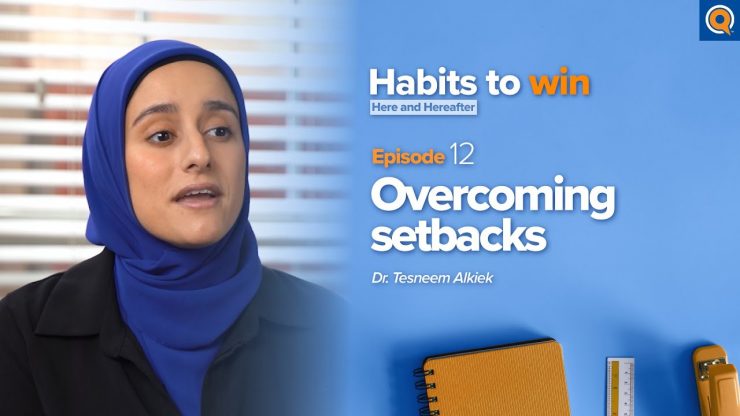When the going gets tough and things inevitably fall through the cracks, it’s how we respond to those challenges that will develop our resilience and boost our growth. Here are two things that will help us weather those storms: the Prophet’s ﷺ advice and creating stretch and backup goals.
Mistakes are part of being human
No matter how hard you try, sometimes things will inevitably fall through the cracks. Being human means not only making mistakes, but also experiencing setbacks. It’s how we respond to these challenges that makes us stronger individuals. If your intentions are right, it’s time to move past the setbacks and persist in your good habits
Seek help from Allah
The Prophet ﷺ gave some of the most relevant advice in this regard.
He ﷺ said, “stick to what benefits you,” meaning keep to your good habits. “Seek help from Allah and don’t give up.” When things get tough, ask for Allah’s help and weather the storm. “And if – or when – something sets you back, do not say ‘if only I had done something else instead, xyz would have happened’. Rather, say that whatever Allah has decreed will happen, because ‘if only’ opens a door to the deeds of Shaytaan”.
Prepare for setbacks
The reality is that things will afflict you. When they do, remember the words of the Prophet ﷺ and keep your head up high. Most importantly, don’t look back with regret wishing you had done something else. If you incorporated good habits with the right intention, the challenges that come your way will push you to do even better, not discourage you from continuing.
When you look back, ask yourself if there’s anything that you can do next time to prepare yourself better. Over time, as you naturally experience the most common setbacks, you will get used to having backup routines ready for the next time things don’t go as planned.
The key to being able to do this without getting turned off is by not discounting the little.
Ceate a chain reaction of good feeling
When you face a setback – for example, you weren’t able to complete a task due to an unforeseen circumstance – it can disrupt a chain of feeling accomplished and threaten to throw off the momentum in your day. This can leave you feeling unmotivated for the rest of the day.
So what’s the solution?
Stretch goals and backup goals
The solution is to create stretch goals and backup goals.
Backup goals are what you know you can accomplish on your hardest, most exhausting day. Your stretch goal is the best that you can accomplish. In between, is your ideal goal, one that you have the capacity to reach on an average day.
When memorizing the Qur’an
Say for example, that you want to memorize the Qur’an. You may have the capacity to memorize two lines every single day; but on good days you can almost double it to four lines. That is your stretch goal.
One line on the other hand, is your backup goal. On your most exhausting days, memorizing one line of Qur’an is manageable or easy.
Plan your day every day to meet that two-line standard. On the days where you’re feeling great, bump it up to four lines. It will produce an even greater sense of reward. For those days that are hard, fall back on your easy, manageable goal of just one line a day. Rather than not meeting your goal at all, you’ve prepared a backlog of what to do when things get tough.
Download the Habits to Win Here and Hereafter Workbook as you follow along with this series!

